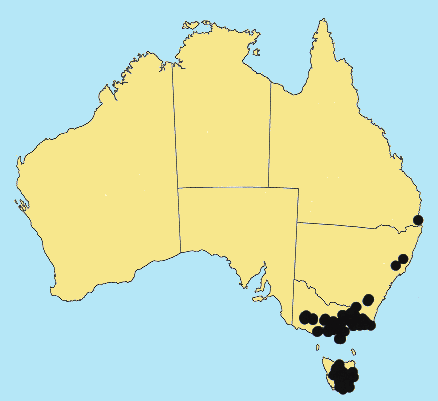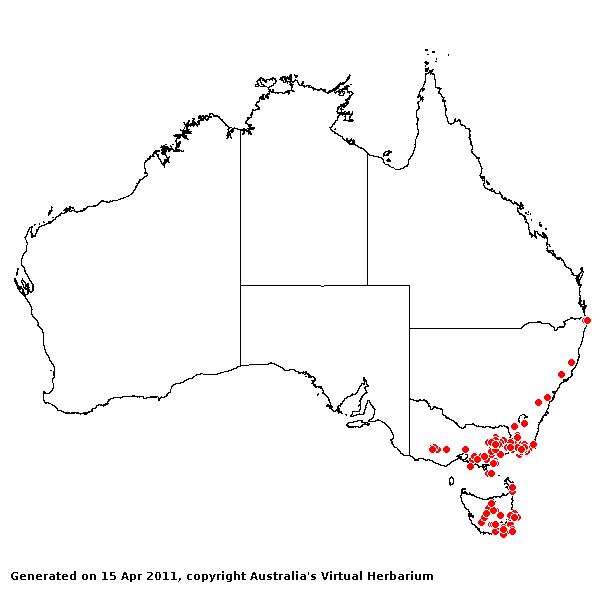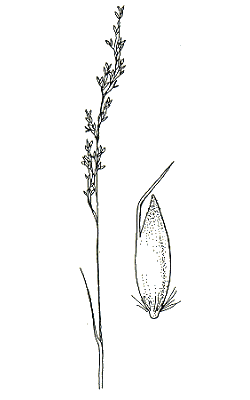Deyeuxia rodwayi Vickery. Contr. New South Wales Natl.
Herb. 1: 60 (1940).
Classification. (GPWG 2001) : Subfamily Pooideae.
Tribe Poeae.
Type of Basionym or
Protologue Information: Australia,
Mt. Wellington: Rodway 20 (K holo).
Key references
(books and floras): [2002] D.Sharp & B.K.Simon, AusGrass, Grasses of
Australia,
[2008] S.W.L.Jacobs, R.D.B.Walley & D.J.B.Wheeler, Grasses of New South
Wales (206), [2009] A.Wilson (ed.). Flora of Australia, Vol 44A. Poaceae 2
(199).
Illustrations:
[2008] S.W.L.Jacobs, R.D.B.Whalley & D.J.B.Wheeler, Grasses of New South
Wales, 4th edn (206), [2009]. A.Wilson (ed.), Flora of Australia 44A:
Poaceae 2 (196, Fig.27).
Habit.
Perennial. Culms erect or geniculately ascending, stature slender to delicate,
15–70 cm tall, 3 -noded. Mid-culm nodes glabrous. Lateral branches simple.
Leaves mostly basal. Leaf-sheaths antrorsely scabrous, glabrous on surface.
Ligule an eciliate membrane, 2–3 mm long, membranous, abaxially scaberulous,
lacerate, truncate. Leaf-blades linear, flat, 4–23 cm long, 0.7–3 mm wide.
Leaf-blade surface indumented.
Inflorescence.
Inflorescence compound, a panicle or a panicle. Panicle linear, 3–13 cm long,
evenly furnished.
Spikelets.
Spikelets pedicelled. Fertile spikelets 1-flowered, comprising 1 fertile
floret(s), with a barren rachilla extension, lanceolate, laterally compressed,
3.5–4.2 mm long.
Glumes. Glumes
similar, thinner than fertile lemma. Lower glume lanceolate, membranous, much
thinner on margins, keeled, 1-keeled, 1 -nerved. Upper glume lanceolate, 3–4.2
mm long, membranous, keeled, 1-keeled, 1 -nerved. Upper glume surface
asperulous.
Florets.
Fertile lemma 3.5–4.2 mm long, without keel, 5 -nerved. Lemma apex erose or dentate,
awned, 1 -awned. Median (principal) awn dorsal, 2 mm long overall, with a
straight or slightly twisted column or with a twisted column. Lodicules
present. Anthers 3. Grain 2 mm long.
Continental
Distribution: Australasia.
Australian
Distribution: Queensland, New South Wales, Victoria,
Tasmania.
Queensland: Moreton. New South Wales:
Southern Tablelands. Victoria: East Gippsland, Eastern Highlands,
Gippsland Highlands, Gippsland Plain, Grampians, Otway Range, Wilsons
Promontory, Snowfields. Tasmania: West
Coast, Ben Lomond, East Coast, South West, Mt
Field, Mt Wellington.
Notes. Endemic. In wet
sclerophyll forests, dry sclerophyll exposed to sea mists and montane
woodlands. Flowers Nov.-Mar.



